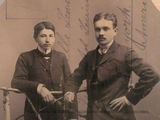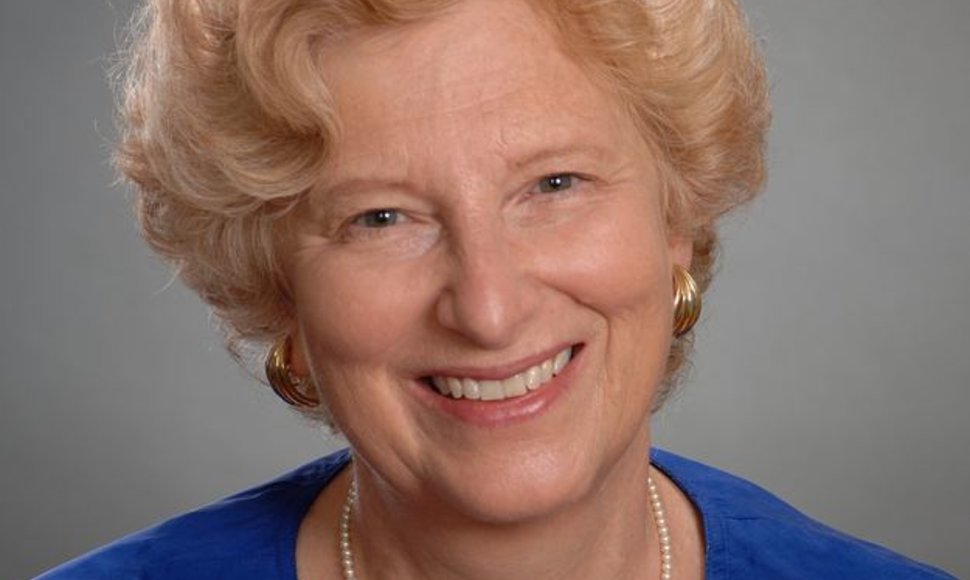- What is your connection to Lithuania?
- I trace my Jewish roots, on my mother’s side, to Rokiškis and Šiauliai. My grandfather came to America from Lithuania in 1911, escaping the czarist draft. Some of my family members perished in the Holocaust in the Rokiškis region. Other family members were confined in the Šiauliai ghetto; some died and some survived.
One uncle who survived the Šiauliai ghetto immigrated to New York, and I grew up with him. Another uncle returned to Lithuania and was deported to Siberia in 1950.
When I visited Lithuania, I was the first in my family to set foot on Lithuanian soil in nearly half a century. I went to Lithuania to connect with my Jewish roots – but my journey soon expanded into an exploration of how Lithuania as a country is engaging with its “Jewish roots,” its Jewish past.
- Writing your book, you have researched the Holocaust in Lithuania. How was it different in Lithuania than in the rest of Eastern Europe? How significant was the contribution of local population?
- Historians agree that the Jews of Lithuania were massacred with a swiftness and thoroughness that was unusual even for that time. It was the German invaders who issued the orders, but in most cases it was members of the Lithuanian “White Bands” who pulled the triggers.
In the three major Lithuanian cities, tens of thousands of Jews were confined in ghettos – and these severe restrictions on the Jewish community were largely administered by ethnic Lithuanians.
The problem of “competing martyrologies” is difficult. If people feel their own suffering is not receiving enough recognition, it can be difficult for them to attend to the suffering of others.
By the end of the war, only 6 percent of Lithuania’s 240,000 Jews remained alive.
- Most of your book is dedicated to the present, though. How are Lithuanians dealing with the Holocaust?
- How does a country scarred by genocide move forward into the future? This question became the heart of my stay in Lithuania and the heart of my book.
One of my most moving encounters took place in my ancestral town of Rokiškis with an old man who had witnessed the persecution of the Jews in 1941. What he saw had tormented him all his life. He wanted to speak to a Jew before he died. I agreed to be that Jew. My time with him was profound – even life-changing for me.
I was surprised, even sometimes shocked, when I met people in Lithuania who seemed not to know much about the Holocaust. At the same time, I was inspired by the extraordinary people I met who have dedicated themselves to exhuming difficult truths and extending hands across cultures. They are the heroes of my book.
- What do you think about Holocaust education in Lithuania?
- The Holocaust education programs I was most impressed by had several attributes in common. They posed questions, rather than supplying answers. They did not force people to repent, but instead invited them to design their own vehicles of remorse. They emphasized the glories of the Jewish past along with the destruction, to help people understand the enormity of what was lost and thus to mourn.
I talked with two women who designed curricula for the International Commission to Evaluate the Nazi and Soviet Occupation Regimes. They told me that if Lithuania is to mature as a nation, Lithuanians must ask themselves rigorous moral questions about the Holocaust. “Our goal,” they said, “is to transform ourselves from a society of bystanders into an active civil society.”
I talked with a leader of a non-profit organization called the House of Memory, which helps schoolchildren talk with their elderly family members about the lost Jewish world.
 |
| Asmeninio archyvo nuotr./Ellen Cassedy's "We Are Here: Memories of the Lithuanian Holocaust" |
I talked with a young gentile woman at the Jewish museum who showed me the discussion questions she was writing for high school students:
-- What do you think of Albert Einstein’s saying, “The world is a dangerous place, not because of those who do evil, but because of those who look on and do nothing”?
-- Have you ever been in a situation where someone needed your help and you didn’t provide it? If so, why did you behave like others, rather than following your conscience?
-- Is there a connection between your answers and the behavior of people during the war?
These efforts call on people to talk with one another, because all of us are needed in the difficult dialogue that must take place.
- As you are rather sympathetic towards Lithuanian efforts in your writings, you yourself have been criticized by people who think that the country is only paying lip-service to fighting antisemitism and accepting the past. Do you think these reproaches are fair?
- Lithuania has done a poor job of bringing former Nazi collaborators to justice. The government’s questioning of several elderly former anti-Nazi Jewish partisans for possible war crimes offended many people around the world. I’ve been distressed to see swastikas painted on Jewish gravestones, and to see prejudice periodically exploding on Internet sites.
At the same time, I’ve been cheered to see that when such incidents occur, some in Lithuania – Jews and non-Jews – have spoken up to condemn them. I feel that those of us outside Lithuania have a role to play, too. When we believe things are going astray, we should speak up. And when we see things going right, I believe we should be vocal in our support.
- What are your views on the so-called 'Double Genocide' concept, which suggests a certain parity between Nazi and Soviet crimes?
- The problem of “competing martyrologies” is difficult. If people feel their own suffering is not receiving enough recognition, it can be difficult for them to attend to the suffering of others.
I have great respect for the work of Saulius Sužiedėlis, the Lithuanian-American historian who has done groundbreaking research on the Holocaust. He emphasizes that Lithuania must make Jewish history integral to Lithuanian history as a whole; must recognize that the Holocaust constituted the major killing in 20th century Lithuania; and must face the participation of ethnic Lithuanians in that killing. He has called for political leadership and sincere dialogue between people of disparate heritages.
- Is there anything else that Lithuania should do - that it is not doing - in order to truly come to grips with the Holocaust?
- The task of facing the difficult truths of the past is not finished, and will never be finished – not for Lithuania, not for any of us.
During the most terrible times in the mid-20th Century, solidarity was often difficult if not impossible. For people who personally experienced those times, it may be difficult or even inappropriate to move on beyond hatred. But for the successor generations, my dream is that we’ll be able to find ways to honor our diverse heritages without perpetuating the fears and hatreds of the past. I hope we can connect ourselves to one another and appeal to one another as fellow beings with the capacity for moral choice.
I once saw a billboard on a street in Vilnius that said “Who, if not you, will determine the future of Lithuania? Become socially active!” It will take the efforts of all of us to achieve that better future.
- Do you know if there are plans to publish your book in Lithuanian?
- Yes! “We Are Here” will be published in Lithuanian this year by the Media Incognito publishing house. Visit my website, www.ellencassedy.com, for news about “We Are Here.”












